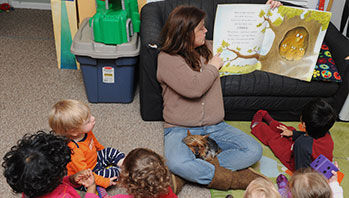- rubber band instruments
- wand
- world map
- folktale
- giant
- make-believe
- music
- musical instrument
- pluck
- sound
- trick
- ukulele
MA Standards:
Literature: RL.PK.MA.1 With prompting and support, ask and answer questions about a story or a poem read aloud.
Literature: RL.PK.MA.9 With prompting and support, make connections between a story or poem and one’s own experiences.
Literature: RL.PK.MA.3 With prompting and support, act out characters and events from a story or poem read aloud.
Language: L.PK.MA.4 Ask and answer questions about the meanings of new words and phrases introduced through books, activities, and play.
Foundational Skills: RF.PK.MA.1.d Recognize and name some uppercase letters of the alphabet and the lowercase letters in one’s own name.
Head Start Outcomes:
Literacy Knowledge/Book Appreciation and Knowledge Asks and answers questions and makes comments about print materials.
Literacy Knowledge/Alphabet Knowledge Recognizes that the letters of the alphabet are a special category of visual graphics that can be individually named.
PreK Learning Guidelines:
English Language Arts/Reading and Literature 6 Listen to a wide variety of age appropriate literature read aloud.
English Language Arts/Reading and Literature 10 Engage actively in read-aloud activities by asking questions, offering ideas, predicting or retelling important parts of a story or informational book.
English Language Arts/Reading and Literature 7 Develop familiarity with the forms of alphabet letters, awareness of print, and letter forms.
Read Together: Abiyoyo #1

© Commonwealth of Massachusetts, Department of Early Education and Care (Jennifer Waddell photographer). All rights reserved.
ELA Focus Skills: Listening and Speaking, Making Connections, Story Comprehension, Vocabulary
Educator Prep: Display a world map so children can see South Africa.
Tell children you are going to read a folktale called Abiyoyo by Pete Seeger. Explain that a folktale is a story that has been passed along to people for many, many years. This is a story that comes from a place very far away called South Africa. You may want to point to South Africa on the map to help children understand that this is a different part of the world from where they live. Encourage children familiar with South Africa to share what they know with the group.
Before You Read
Tell children that you will read a book about a giant named Abiyoyo. Ask children if they have ever read a book about a giant. Explain that giants are very big and strong and sometimes very mean. Assure children that giants are just make-believe characters and not real people.
- Say, Stand up and show me how big you think a giant might be.
- What kind of sounds do you think a big giant would make? Encourage children to act out the sounds.
Hold up the book and point to and read the title. Ask volunteers to point to and name familiar letters in the title. Point to the author and illustrator names as you tell children that Pete Seeger wrote the story and Michael Hays made the illustrations.
As You Read
Invite children to act out gestures and sound effects.
- Have children wave their arms and say Zoop! when the dad waves his wand, pluck their rubber band guitars when the boy strums his ukulele, and dance when Abiyoyo starts dancing to the music the boy makes.
- Point to the illustrations to clarify the meaning of unfamiliar words such as ukulele, pasture, shadow, fingernails, and staggered.
- Draw attention to the ukulele and ask, Do you know another musical instrument that is similar to the ukelele? Do you know the name of the girl who played that instrument?
After You Read
Ask questions such as,
- Why did the boy get into trouble with the people in the town for playing music?
- Why did the dad get into trouble for doing tricks on people? Explain that a trick is something you do to fool someone. Ask, Did anyone ever play a trick on you or someone you know?
- How did the boy help save the town from Abiyoyo?
Adaptation: Some children are frightened of giants. You may want to allow children to leave the circle and read in the Library Center if they are frightened. Ensure them that it is okay to be frightened.
